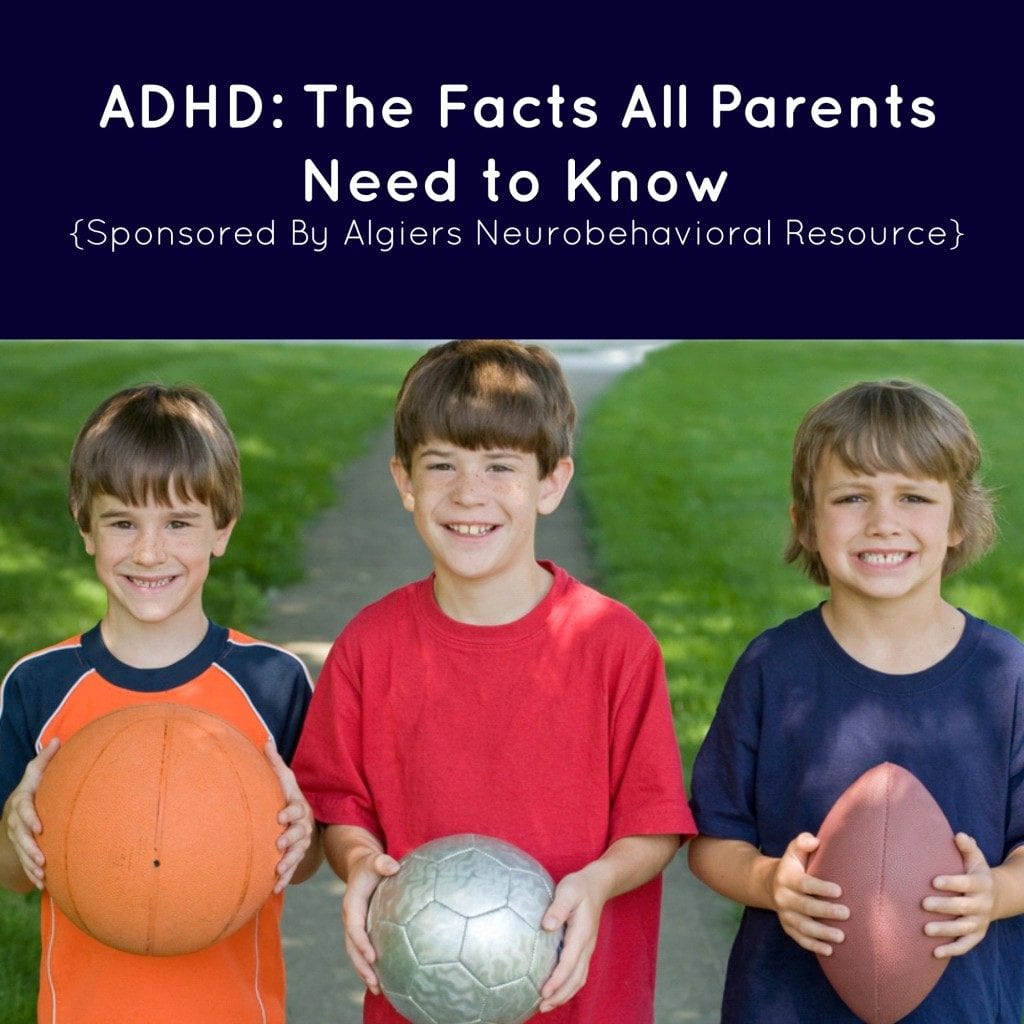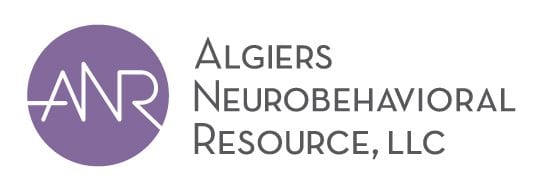Disclosure :: ADHD is a hot button topic these days. The idea of diagnosis is daunting, the topic of medication is disputed, and for those that are experiencing the symptoms (as an adult, as a child OR as a parent), we have no doubt that it can be difficult! This is a sponsored post by Melissa Dufrene, Psy.D, a Clinical Psychologist at Algiers Neurobehavioral Resource, LLC . That said, we are happy to open a dialogue about this issue AND to have a professional clear up some common misconceptions.
ADHD: The Facts All Parents Need to Know
Back in May, The Advocate published an article on the high rates of ADHD in Louisiana. There are some additional points about ADHD that need to be made and/or clarified.
ADHD is Real
The misconception that ADHD is not real is rooted in negative ideas about medication, parenting methods, the education system and the mental health field. However, the topic has been well researched and has shown that individuals properly diagnosed with ADHD differ in very real  and measurable ways. ADHD is a neurobehavioral disorder. This means that the brains of people with ADHD differ in some way from those without, which results in inattention, hyperactivity, and/or impulsive behavior. Individuals with ADHD may have different brain wave patterns, cognitive weaknesses, and real-life difficulties. Further adding to the confusion is the fact that there are three different types of ADHD (hyperactive, inattentive and combined).
and measurable ways. ADHD is a neurobehavioral disorder. This means that the brains of people with ADHD differ in some way from those without, which results in inattention, hyperactivity, and/or impulsive behavior. Individuals with ADHD may have different brain wave patterns, cognitive weaknesses, and real-life difficulties. Further adding to the confusion is the fact that there are three different types of ADHD (hyperactive, inattentive and combined).
ADHD is Not the Only Cause of Inattention and Hyperactivity
Wouldn’t you be suspicious if you went to the doctor complaining of frequent headaches and you were told, in no short order, that you had a brain tumor? You would recognize that the doctor had skipped a few steps and jumped straight to the most severe possibility. This is what happens in the case of an improper ADHD diagnosis. The fact is that several other diagnoses overlap with symptoms of ADHD. Consider what effect a learning disorder could have on attention. When people do not understand what is happening around them they will zone out and look inattentive. Additionally, depression and anxiety can contribute to poor attention and misbehavior. It is important that each possibility be carefully ruled out with a comprehensive assessment.
Without a Proper Assessment There is Much Room for Error
A thorough assessment should be done by a licensed clinical psychologist. An assessment for ADHD has several components. ADHD does not occur only at home or only at school; thus, behaviors in multiple settings should be examined via an interview with a primary caregiver and at least one other source (teacher, coach, family friend). The interview may consist of both discussion and formal questionnaires. However, relying entirely on a parent report leaves many stones unturned. For one thing, the child should also have an opportunity to discuss their own opinion of th eir behaviors and moods. Additionally, the child needs to complete cognitive and achievement testing. Cognitive testing provides information about an individual’s strengths and weaknesses. Again, individuals with ADHD tend to show weaknesses in particular areas. Achievement testing indicates where the child stands academically, compared to others their age. This helps examine for the presence of a learning disorder, which as you now know, can also impact attention and hyperactivity. Finally, some testing specific to ADHD should be done. There are well researched tests that require sustained focus, test the ability to ignore distractions, and provide opportunities for impulsivity to be displayed. In total, the full assessment takes several hours. You may be thinking that is unreasonable for a child with ADHD symptoms. A skilled psychologist will know how to pace the testing and to include breaks and rewards to keep the child going. Occasionally, two (or more) appointments may be necessary.
eir behaviors and moods. Additionally, the child needs to complete cognitive and achievement testing. Cognitive testing provides information about an individual’s strengths and weaknesses. Again, individuals with ADHD tend to show weaknesses in particular areas. Achievement testing indicates where the child stands academically, compared to others their age. This helps examine for the presence of a learning disorder, which as you now know, can also impact attention and hyperactivity. Finally, some testing specific to ADHD should be done. There are well researched tests that require sustained focus, test the ability to ignore distractions, and provide opportunities for impulsivity to be displayed. In total, the full assessment takes several hours. You may be thinking that is unreasonable for a child with ADHD symptoms. A skilled psychologist will know how to pace the testing and to include breaks and rewards to keep the child going. Occasionally, two (or more) appointments may be necessary.
Kids With ADHD Receive the Message That They Are “Bad”
These kids constantly hear, “stop,” “no,” and “don’t!” They also tend to be rejected by their peers. Over time, they learn that they are “bad” and may begin to accept it as the truth. Research has shown that a more effective and beneficial method is to focus on and reward the behaviors that are desirable. Begin by spending a few days giving your child extra verbal praise for all the things they do right. There is no task too small to praise. As you become more comfortable with this you can work with your child to create a plan for how they can earn rewards. The goal is to shift away from punishment and towards rewards. The wonderful thing about this system is that it teaches children that they have to work for the things that they want. While there are books that can help with this plan, such as those by Dr. Russell Barkley, many parents find it easier to work with a psychologist for guidance. Also, beware of how you talk about your child’s difficulties. You want them to learn that although their brain may work differently, they are as smart and capable as anyone else.
Are you interested in an assessment of your child? Contact Algiers Neurobehavioral Resource, LLC for a FREE first visit. You can learn more about them by visiting their website, check out their Facebook page or call (504) 636-6120.
 Melissa Dufrene, Psy.D, is a Clinical Psychologist at Algiers Neurobehavioral Resource, LLC. She completed her undergraduate education at Louisiana State University and her graduate work at Forest Institute of Professional Psychology. Dr. Dufrene is proud to be in private practice in the New Orleans area, and works to contribute to the community through volunteer endeavors. Algiers Neurobehavioral Resource, LLC provides individual and family counseling, in addition to psychological and neuropsychological evaluations. Dr. Dufrene has a specific interest in the assessment and treatment of children and adults with ADHD, anxiety disorders, trauma, and depression. There are current openings for assessment and therapy services. She can be reached at 504-636-6120. For more information visit algiersneurollc.com.
Melissa Dufrene, Psy.D, is a Clinical Psychologist at Algiers Neurobehavioral Resource, LLC. She completed her undergraduate education at Louisiana State University and her graduate work at Forest Institute of Professional Psychology. Dr. Dufrene is proud to be in private practice in the New Orleans area, and works to contribute to the community through volunteer endeavors. Algiers Neurobehavioral Resource, LLC provides individual and family counseling, in addition to psychological and neuropsychological evaluations. Dr. Dufrene has a specific interest in the assessment and treatment of children and adults with ADHD, anxiety disorders, trauma, and depression. There are current openings for assessment and therapy services. She can be reached at 504-636-6120. For more information visit algiersneurollc.com.
















